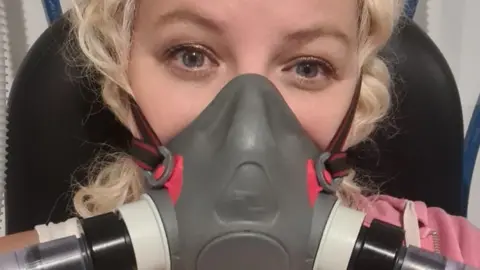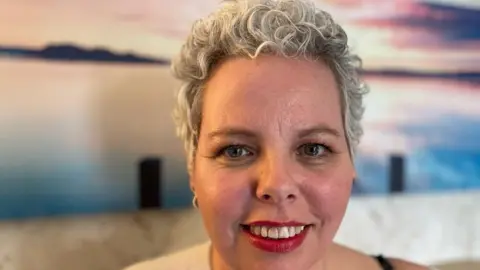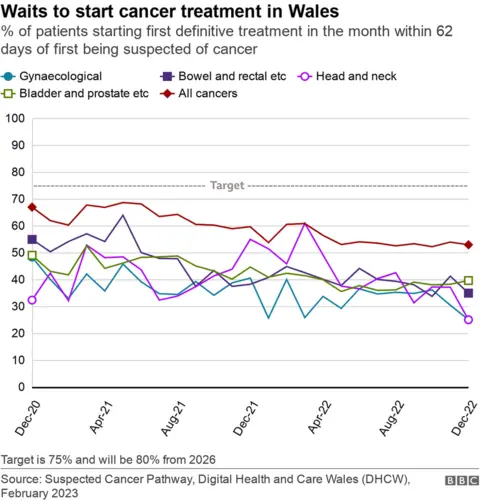Cancer in crisis warning over long treatment waits in Wales
 Ailsa Guard
Ailsa GuardCancer care is in crisis in Wales as some patients face anxious waits for treatment, a charity has warned.
About half of all patients will be treated within 62 days of the disease being suspected, but for gynaecological cancers it is as low as a quarter.
Head of Macmillan Cancer Support Richard Pugh said: "We're in a bad place in Wales at the moment."
Wales' top cancer doctor Prof Tom Crosby said more patients were being treated, but demand is growing.
The target is that 75% of patients will wait less than 62 days from the point of suspicion to starting treatment - but this has never been met, with the number currently at 52.9%.
Ailsa Guard described being pushed to her limits, with her mental health being badly affected, as she waited seven months from the point of suspicion to start treatment for breast cancer.
"I just went into a bit of a meltdown, thinking I'm going to die from this because I don't know how long this has been in my system," she said.
The mother-of-two found a lump under her arm in November 2021, and her GP referred her for a scan.
It proved inconclusive, but a second scan on 2 February, 2022 was diagnosed as cancer.
 Ailsa Guard
Ailsa Guard"I naively thought you get told you have cancer and things are done really quickly," she said, explaining that she eventually started chemotherapy in June 2022.
"I'm a completely different person coming out of it the other side. It's been one of the most horrendous, draining periods of my life."
"In the beginning it was the delays that changed me a lot. That started the anxiety off in me - I felt like I was in a little box screaming and no one was listening to me. I was having to chase things."
She described "screaming and shouting" for quicker treatment, adding: "I was only 46 then - 47 now - I don't want to die, I've got two kids, I've got a life, I want to live."
A year on from first finding the lump, she has had five months of chemotherapy, has just finished a course of radiotherapy and is about to start two years on a new drug.
The target is three quarters of patients will wait less than 62 days from the point of suspicion to starting treatment.
"The figures are showing that we're in trouble and cancer is in crisis in Wales, with that target not being met again," Mr Pugh added.
"This isn't just this month. It's an ongoing basis and we have to call it out for what it is - we're in a bad place in Wales at the moment."
He described the impact of waiting as "huge", with the effect on individuals and families growing the longer it goes on.
Mr Pugh said: "We used to see a lot of people who are worried.
"Well, now we are seeing worried-diagnosed and what that means is they're coming forward for more information from us and other charities - particularly around psychological services and counselling."
 Ailsa Guard
Ailsa GuardFor gynaecological cancers, there were 76 cases in December, with 25% treated within the target.
Head and neck cancers also saw just a quarter of cases treated within the target, though there were fewer cases.
Lower gastro-intestinal cancers, such as bowel cancer, accounted for 189 cases in December, with just 34.9% of them being treated in under 62 days.
Urological cancers had similarly high numbers at 265, with 39.6% meeting the target.
Other cancers fare better - there were 286 skin cancers in December with 74.8% meeting the target, though that is still slightly below the target.
So why is there such a discrepancy between the different types of cancers?
"Our staff are diagnosing and treating more patients than they've ever treated before," explained Prof Tom Crosby, national clinical director for cancer in Wales.
"But demand is outstripping the capacity we have.
"And although the reasons for that shortfall and capacity vary between people, between machines, between facilities and hospitals... the main problem we have is in the cancer workforce and it's just not very easy to correct in the short-term."
He also described pathways for patients as varying wildly. Some need just one or two tests to confirm cancer, while others may need five steps and these can be more complicated.

Earlier this year, the Wales Cancer Network launched a three-year improvement plan to tackle patient outcomes and experiences.
Within that were plans for rapid diagnostic centres and regional hubs.
While patients might be accustomed to travelling further for treatment at specialist cancer centres, Prof Crosby said he would like to see resources being pooled in other areas too.
Despite waits, patient surveys suggest 92% rate their care as either very good or excellent.
But Prof Crosby described the situation overall in Wales as "unacceptable", adding: "I would say that the challenges we are facing, we haven't experienced ever before.
"I wouldn't like to use the word crisis. I don't predict that the performance in our pathways will get a lot worse, but I think it will take a little while before they get better."
A Welsh government spokesman said: "The NHS is working hard to reduce waiting times and we are investing heavily in cancer services to improve early detection and provide rapid access to investigation, treatment and high-quality care.
"We recently announced £86m for new cancer diagnostic and treatment facilities and are increasing the number of training places for specialists in cancer diagnosis, treatment and palliative care."
